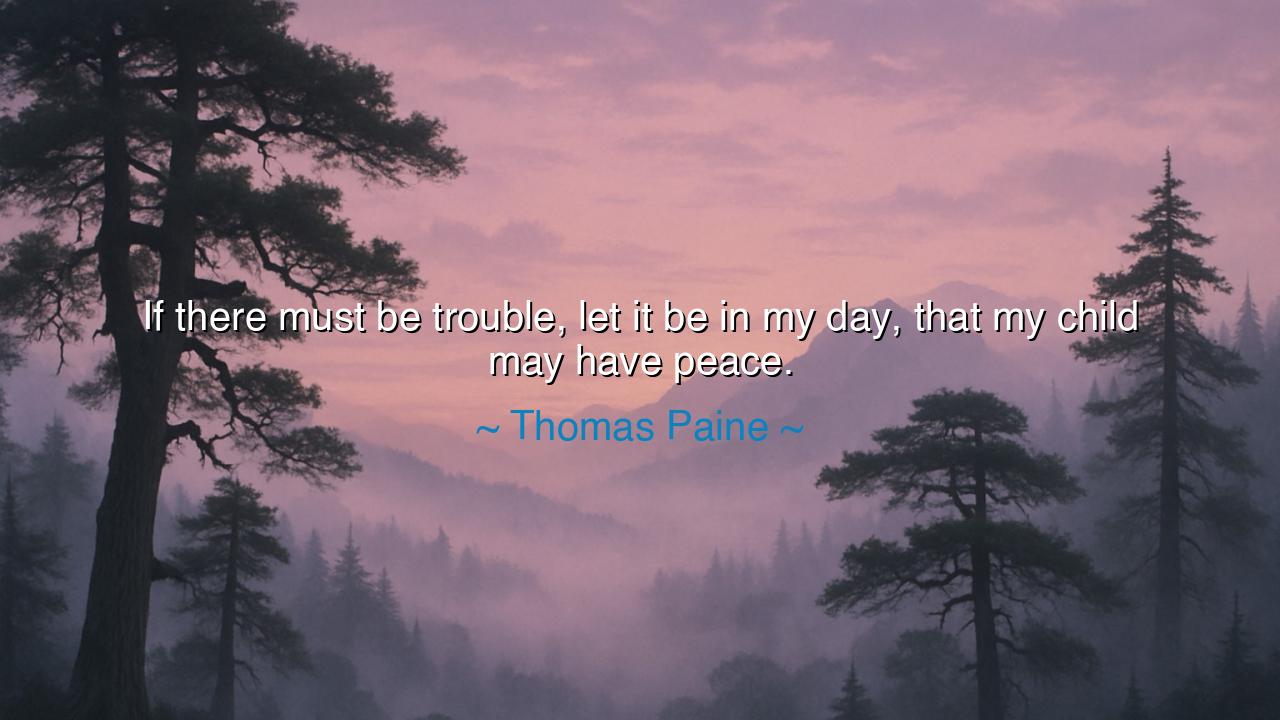
If there must be trouble, let it be in my day, that my child may






Hear the solemn and selfless cry of Thomas Paine, who declared: “If there must be trouble, let it be in my day, that my child may have peace.” These words were not spoken in ease or comfort, but in the fiery crucible of the American Revolution, when the destiny of a people hung upon the edge of war. Paine’s voice was the voice of sacrifice, a father’s spirit made universal, a pledge that he would bear the weight of strife so that the generations to come might rest in harmony. His words are both heroic and tender, reminding us that true greatness lies not in seeking safety for oneself, but in enduring hardship for the sake of others.
Mark well, O seeker of wisdom, the heart of this declaration: Paine did not desire trouble, but he accepted it as inevitable in the struggle for liberty. He did not flee from it, nor did he wish to postpone it, pushing the burden upon his children. Instead, he embraced it in his own time, declaring that his shoulders, not theirs, should carry the storm. In this lies the very essence of parental love and civic duty: the willingness to stand in the fire so that the innocent may live in peace.
History has given us many who bore this same burden. Consider George Washington and his men at Valley Forge, enduring hunger, cold, and despair so that a nation unborn could rise into freedom. Their sacrifice was not for themselves, for many would never see the fruits of their labor. It was for their children, and their children’s children, that they suffered. Or look to Winston Churchill, who in the darkest days of World War II declared that Britain must fight on, not because victory was certain, but because surrender would condemn future generations to chains. Both Paine and these leaders understood the same truth: that peace for the next age requires courage in the present one.
Yet Paine’s words go deeper than politics or war. They strike at the eternal truth of human life: that every generation is tested, and every generation must decide whether to endure hardship for the sake of those who come after. The farmer who toils in the field plants not only for his own bread, but for the harvests his children will reap. The teacher who labors with patience shapes not only today’s students, but tomorrow’s leaders. The mother who sacrifices her own dreams for her child’s well-being follows the same law Paine proclaimed. This is the ancient rhythm: that we endure, so others may rest; we labor, so others may live free.
But let us not mistake this teaching for blind resignation. Paine did not speak of trouble as something to be welcomed—he spoke of it as something to be confronted with courage. His was a call to arms, not for glory, but for necessity. To say, “let it be in my day,” is to declare that we will not leave the burden for others, we will not run from the duty of our time. It is the spirit of responsibility, of stewardship, of guardianship over the future. It is the recognition that peace is not a gift easily won, but one bought at the price of struggle.
The lesson for us, O listeners, is clear: do not shrink from the struggles of your age. Whether they be wars of injustice, battles against poverty, or struggles for truth and dignity, do not pass them on to your children unresolved. Stand firm in your time, so that they may walk in lighter steps. Do not say, “Let the next generation handle it.” Say instead, as Paine said, “Let it be in my day.” For such courage ensures that tomorrow may be brighter than today.
Therefore, let us walk the path of sacrifice with honor. In our homes, let us bear hardship with patience for the sake of our families. In our communities, let us strive for justice, even if the fight is hard. In our nations, let us face the storms of division and corruption with unflinching resolve. For if we endure now, our children shall inherit peace, and they shall bless our names long after we are gone. Thus does Paine’s cry echo through the centuries: to bear the burden today, so that tomorrow may sing with peace.






AAdministratorAdministrator
Welcome, honored guests. Please leave a comment, we will respond soon